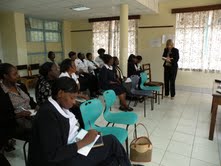
When the Government of Kenya passed the Sexual Offences Act of 2006, members of Parliament probably had no idea how important this landmark legislation was or how cumbersome it would be to sort out. The Sexual Offences Act (SOA) is a law that encompasses over 200 sex-related crimes ranging from gang rape to forced kissing. Prior to the passage of the SOA many of these crimes went without criminal investigation or punishment of the offender. An outcome of the SOA was the formation of a Sexual Offences Act Task Force, a multidisciplinary board chaired by a judge and comprised of representatives of government ministries and some members of civil society. When problems arise within the scope of the SOA it indeed takes a village to find solutions. Such issues are brought forward to the SOA Task Force.
Historically, a major problem with clinical, post rape care was that only one doctor in the country was authorized to conduct post rape examinations in Kenya. Survivors of violence would sometimes wait in queues for days to be seen by this doctor. This untimeliness would result in physical evidence being lost or destroyed and any bodily injuries would be healed before the patient was examined. Worse, the doctor was expected by law enforcement to determine whether a crime of rape or defilement had occurred. In reality, it is not the duty of a doctor to determine if a crime has happened. Rather, it is the duty of the police to investigate violations of the law. The Kenyan people have been misled for decades to believe that a doctor could formulate a “diagnosis” of rape while rape is not a medical diagnosis. Rape is a crime that warrants police investigation.
Typically, when a person in Kenya becomes a crime victim, they must report to the police and complete a police document known as the P3 form. Kenya Police will not investigate any incident without the filing of a P3 form. For reports of sexual assault, this protocol meant that the survivor would be burdened by finding transportation to hospital for treatment, then travel to a police station to obtain the P3 form, and return to the hospital with the P3 form for a doctor’s signature, certifying that rape had occurred. The clinical information on the P3 is minimal but it is the doctor’s “certification of rape” that spurs the police to investigate the crime.
In recent weeks, the SOA Task Force has reached a new milestone with the official passage of a policy or “gazettement” by the Attorney General that allows nationwide use of the post rape care (PRC) form as a valid, forensic document. Medical doctors, registered nurses and clinical officers may now conduct post rape examinations and document their clinical findings on the approved form. The PRC form captures critical data about the medical examination and provides forensic documentation of the clinical findings. If forensic evidence is collected, it also will be noted on the form. The PRC form will be available at all hospitals and clinics and should prove to be invaluable evidence in the prosecution of sexual offences.
Also gazetted (made official) were registered nurses and clinical officers as expert witnesses who may give testimony in a court of law. The news of this milestone is refreshing to me especially as I reflect on an article, “Why rapists are let off”, published in Kenya’s Daily Nation newspaper on March 12, 2009 when I was quoted asking why nurses were not allowed to testify in rape cases yet they are the ones who treated the victims.
Congratulations to the SOA Task Force and to all the people who have worked so long and hard on these key issues. The passage of these policies is a giant step forward for the people of Kenya.
Nancy Caleus, DNP, RN, Senior Fellow, CHMP










Pingback: Kenya Reaches Milestones in Post-rape Care « thehealthcrusader / January 15, 2013
/